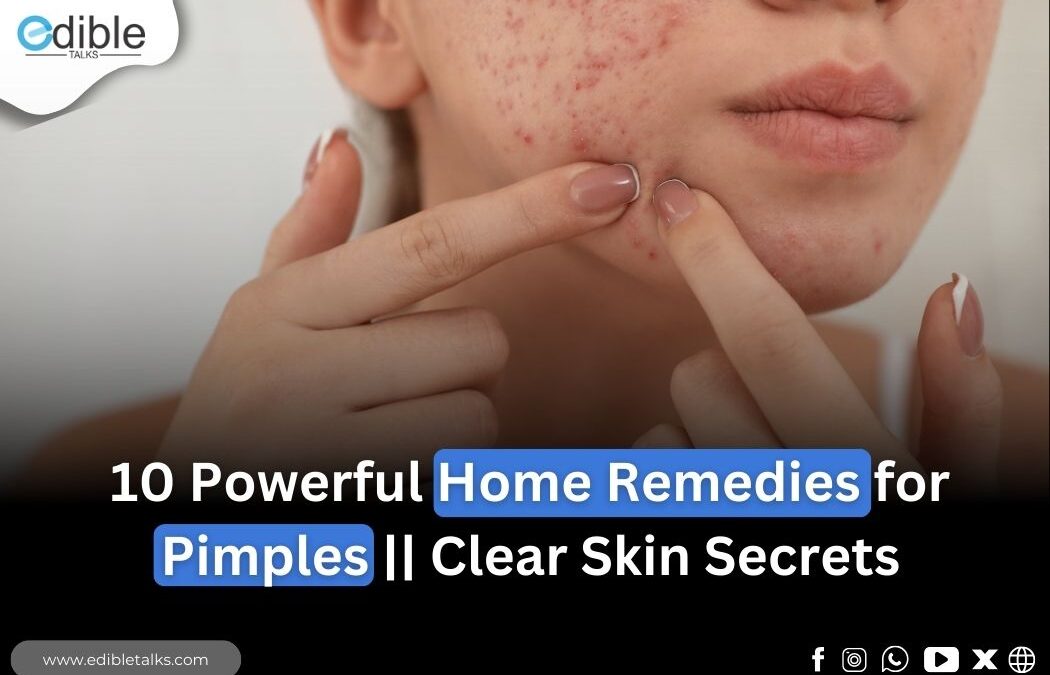Home Remedies for Pimples
Home Remedies for Pimples: Pimples are a common skin issue caused by clogged pores, excess oil, and bacteria. While over-the-counter treatments can help, many people prefer home remedies for a natural, gentle approach to managing breakouts. With easily accessible ingredients like aloe vera, honey, and tea tree oil, home remedies can soothe inflammation, reduce pimples, and promote clearer skin—all without the harsh chemicals found in some commercial products. In this post, we’ll explore some of the most effective home remedies to help you fight pimples naturally.
How are pimples formed?
Pimples form when the sebaceous glands under the skin produce too much oil. This oil normally moisturizes the skin, but when it’s produced in excess, pores become clogged and create an environment conducive to bacterial growth. This results in swelling, redness, and pus-filled bumps or pimples.
Types of pimples:
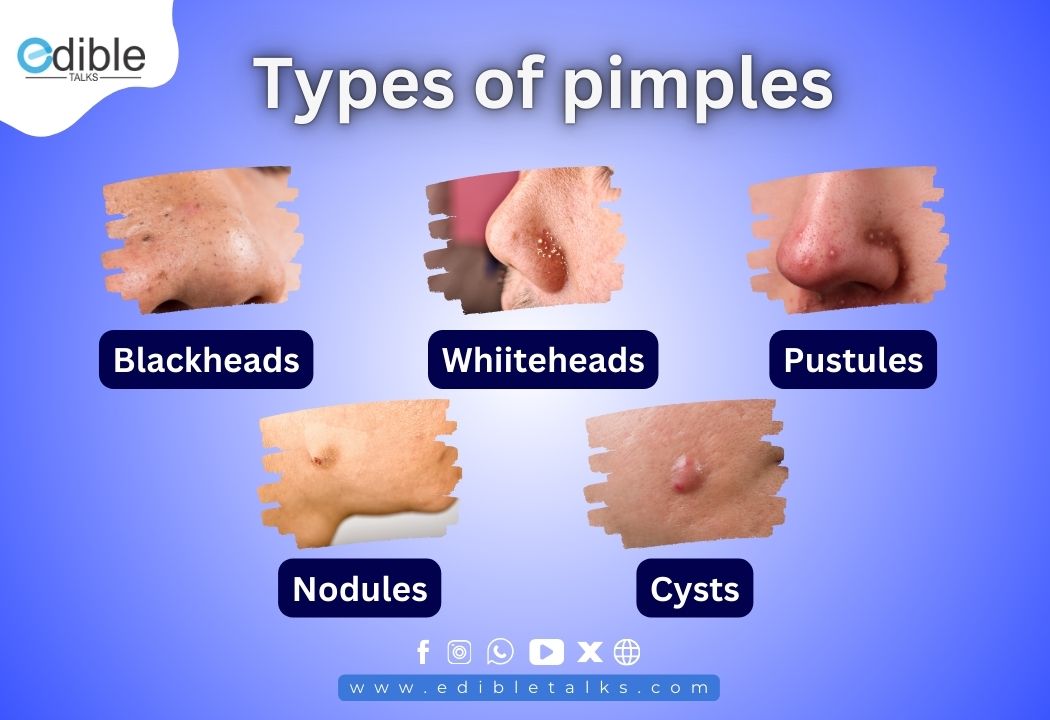
-
Blackheads:
- These are pimples in which sebum and dead cells accumulate in the pores and turn black when exposed to oxygen.
-
Whiteheads:
- These are pimples in which the pores are blocked and a white layer is formed on top of them.
-
Pustules:
- These are small yellow or white pus-filled bumps, which are signs of skin inflammation.
-
Nodules:
- These are deep and hard bumps, which can be more painful and take longer to heal.
-
Cysts:
- These are large, soft, pus-filled pimples that form deep in the skin and can leave scars.
Causes of pimples:
-
Hormonal changes:
- During puberty, the sebaceous glands become more active due to increased levels of hormones (especially androgens).
-
Dietary habits:
- High fat or sugary foods, milk or dairy products can also cause pimples.
-
Stress:
- Stress and anxiety can affect the level of hormones in the body and cause pimples to develop.
-
Lack of skin cleanliness:
- If the skin is not kept clean, the pores become clogged, which increases the risk of pimples.
-
Family history:
- If someone in the family has a lot of pimples, it can affect the next generation.
Treatment and Precautions:
-
Cleansing:
- Wash the face twice a day with a mild cleanser to remove oil and impurities.
-
Use of Moisturizer:
- Use an oil-free moisturizer to keep the skin soft and moisturized.
-
Medicines:
- If the pimples are large, moisturizing creams or antibiotics can be used in consultation with a dermatologist.
-
Diet:
- Avoid fatty foods and dairy products, and drink plenty of water to flush toxins from the skin.
-
Don’t squeeze blackheads or whiteheads:
- Squeezing them can spread the infection and cause scarring.
Pimples usually clear up on their own with time, but if the problem becomes severe, it is best to consult a doctor.
Causes of pimples In Details
The main cause of pimples is the clogging of skin pores and accumulation of sebum, dead skin cells, and bacteria. In addition, many factors and physiological changes also cause the formation of pimples. Here are the causes of pimples:
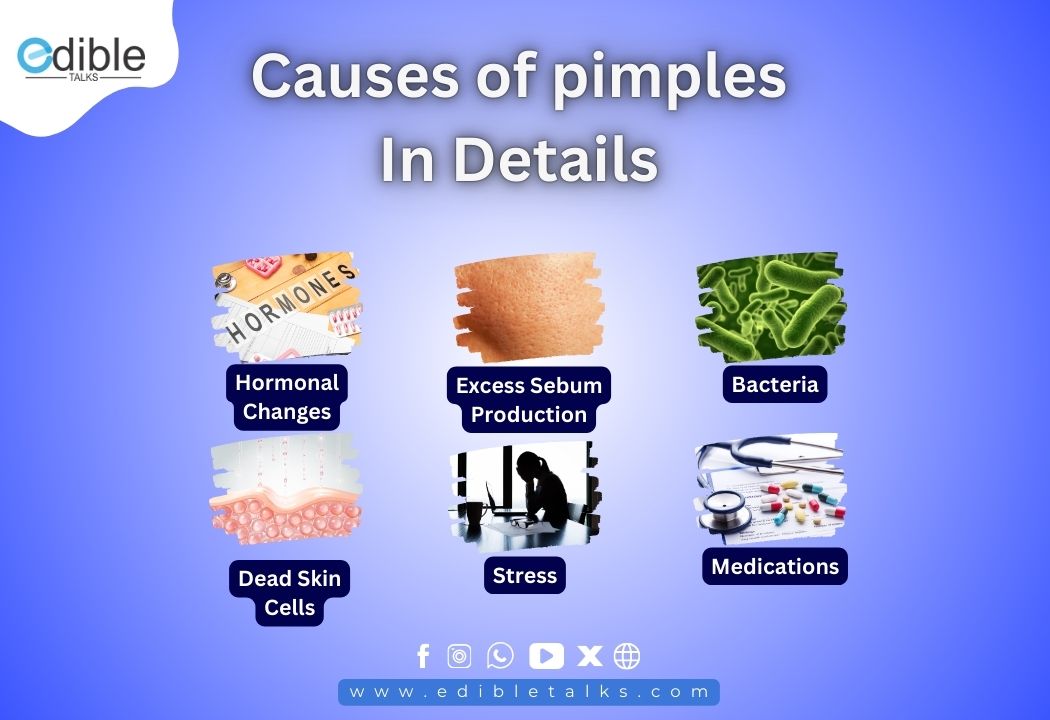
-
Hormonal Changes:
The most common and important cause of pimples are hormonal changes, especially:
-
Puberty:
- When boys and girls go through puberty, the level of a hormone called androgen increases in their body. Androgens make the sebaceous glands overactive, causing them to produce more oil and clog pores, resulting in pimples.
-
Menstruation:
- Hormone levels change during menstruation in women, due to which pimples may appear more during these days.
-
Pregnancy:
- During pregnancy there is also a change in hormones, which can cause pimples to form on the skin.
-
Excess Sebum Production:
Sebaceous glands produce sebum on the surface of the skin, which provides moisture to the skin and prevents it from drying out. But when these glands produce too much sebum, it accumulates in the skin pores and clogs them. Pimples form when pores become clogged due to bacteria and inflammation.
-
Bacteria:
On the surface of the skin there is a bacteria called “Propionibacterium acnes” or P. acnes for short. These bacteria combine with sebum and dead skin cells in the skin to clog pores and cause inflammation, causing pimples.
-
Dead Skin Cells:
The skin is constantly making new cells and shedding old dead cells from the body. But sometimes these dead cells accumulate in the pores and combine with sebum to clog the pores. This can result in pimples.
-
Genetic Factors:
If a parent or sibling in the family suffers from pimples, there is a possibility that you may also have a problem with pimples. Genetically, the tendency to pimples can be hereditary.
-
Dietary Factors:
Diet can also play a role in the formation of pimples, especially:
-
Fatty foods:
- Eating foods that are high in fat or sugar makes the sebaceous glands overactive, which can lead to pimples.
-
Dairy products:
- High consumption of milk and milk products can also cause pimples in some people, as they can affect hormone levels.
-
High-glycemic foods:
- Such as sugar, junk food, and foods made with white flour quickly raise blood sugar levels, which increases insulin and results in overactive sebaceous glands.
-
Stress:
Stress and anxiety affect the levels of hormones in the body, especially the hormone cortisol. Overgrowth increases oil production and can cause inflammation in the skin, which causes pimples.
-
Medications:
Certain medications can also cause pimples, especially medications that contain hormones or steroids. Skin inflammation and pimples can form as side effects of these medicines.
-
Environment and skin care products:
-
Pollution and dirt:
- Pollution, smoke, and dirt in the outdoor environment can clog skin pores and cause pimples by causing skin inflammation.
-
Substandard skin products:
- Products that are not suitable for the skin, especially oily ones or substandard moisturizers, can clog pores and lead to pimples.
-
Touching Face Frequently:
Frequent touching of the skin transfers bacteria and dirt from the hands to the skin, which can clog the pores and increase the problem of pimples.
-
Misuse of make-up and cosmetics:
Using oily or heavy makeup can also clog the skin pores and lead to pimples, especially if the makeup is not removed properly.
-
Sweat:
Excessive sweating can also clog skin pores, especially if the sweat dries and stays on the skin. This clogs the pores, causing bacteria to grow and pimples to form.
Benefits of Using Home Remedies for Pimples
Using home remedies or remedies to treat pimples is a popular and safe method, especially for mild to moderate pimples. These treatments are based on natural ingredients and help avoid the negative effects of chemical products on the skin. There are many types of home remedies which are simple, easy and affordable. Here are the benefits of home remedies for pimples in detail:
-
Efficacy and safety of natural ingredients:
The ingredients used in home remedies like honey, lemon, aloe vera, tea tree oil, and turmeric are natural and do not contain any chemicals. These ingredients are less harmful to the skin and usually do not harm the skin. Compared to chemical-based products, these natural ingredients reduce skin sensitivity and improve overall skin health.
-
Safe from side effects:
One of the main advantages of home remedies is that they have very few side effects. Some medications and products on the market can cause inflammation, itching, or dryness on sensitive skin, while natural remedies are generally safe and gentle on the skin.
-
Easily Available and Cheap:
Ingredients required for home remedies are already available in most homes, such as honey, aloe vera, lemon, and turmeric. Their use does not require expensive cosmetic products or treatments, making the procedure cheaper and easier.
-
Making skin soft and smooth:
Many home remedies not only help to get rid of pimples, but also help to make the skin soft and smooth. For example:
- Honey: Honey has antibacterial properties that help kill bacteria on the skin and reduce inflammation.
- Aloe Vera: Aloe vera moisturizes the skin, reduces inflammation and helps to fade pimple marks.
-
Antibacterial and Anti-Inflammatory Properties:
Several ingredients in the home remedy, such as tea tree oil and turmeric, have natural antibacterial and anti-inflammatory properties, which help reduce the effects of bacteria on the skin and reduce inflammation. These ingredients also help in cleansing the skin and unclogging the pores.
- Tea Tree Oil: Tea tree oil is an effective antibacterial oil that kills bacteria on the skin and reduces inflammation and redness.
- Turmeric: Curcumin present in turmeric is a powerful anti-inflammatory agent that is effective in treating pimples.
-
Protecting skin from damage:
Chemical treatments or the use of harsh products can damage the skin cells, leading to increased skin sensitivity and scarring after pimples. The natural ingredients used in home remedies treat the skin without harming it and maintain the natural pigment of the skin.
-
Long Term Results:
Home remedies provide long-lasting results for treating pimples, as they address issues from within the skin, such as excess oil, dead cells, and bacteria. With regular use, they help prevent pimples and improve overall skin health.
-
Peace of Mind and Relaxation:
When using home remedies you know that you are protecting your skin from some kind of chemicals. It gives peace of mind and no fear of skin damage.
Precautions:
Although home remedies are generally safe, people with sensitive skin should test a small amount before using them to make sure there are no allergies or reactions. If the condition of pimples is more serious, it is better to consult a doctor.
Top Home Remedies for Pimples
Home remedies for treating pimples are considered quite effective and safe, especially for those who are looking for natural and inexpensive methods. Natural ingredients are gentle on the skin and have fewer side effects than most chemical products. Here are the best home remedies for pimples:
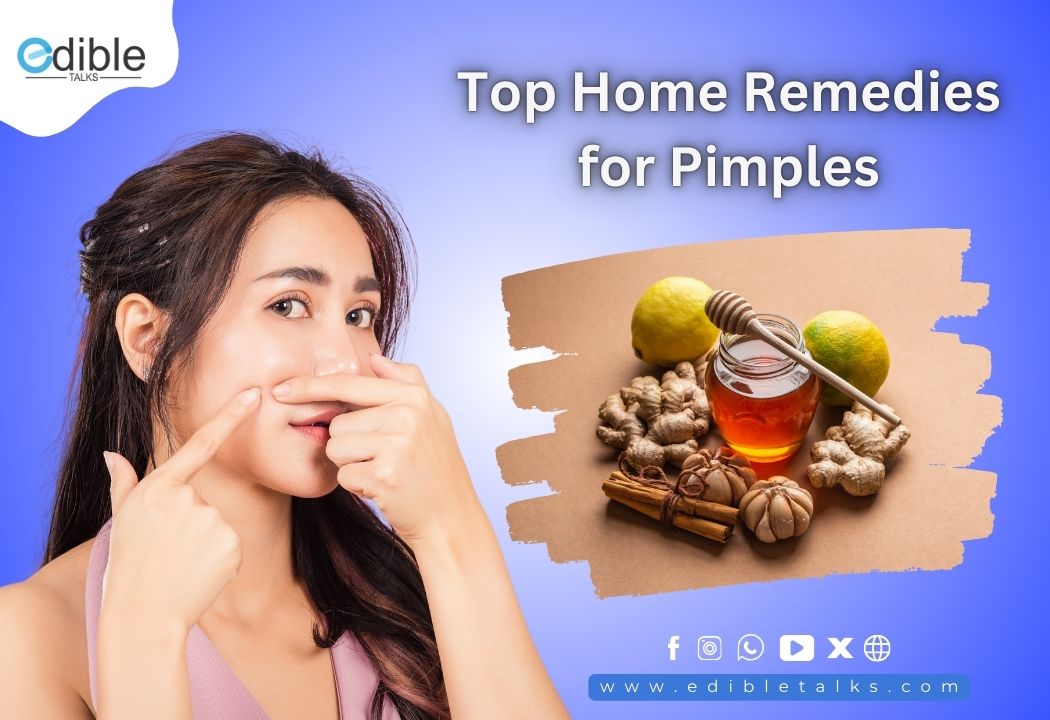
-
Tea Tree Oil:
Tea tree oil has natural antibacterial and anti-inflammatory properties, which clean the skin pores to eliminate bacteria and reduce inflammation.
Method of use:
- Tea tree oil can be harsh to apply directly to the skin, so use it mixed with a carrier oil (such as coconut oil or olive oil).
- Apply it on the pimples with the help of cotton and wash off after 15-20 minutes.
-
Honey and Cinnamon Mask:
Honey has natural antibacterial properties, while cinnamon has anti-inflammatory elements that reduce skin inflammation and clear the skin.
Method of use:
- Mix half a spoon of cinnamon in 1 spoon of honey and make a paste.
- Apply this paste on the pimples for 10-15 minutes and then wash off with lukewarm water.
-
Aloe Vera Gel:
Aloe vera is known for moisturizing the skin and reducing inflammation. Its antibacterial properties prevent the growth of pimples.
Method of use:
- Apply fresh aloe vera gel directly on the pimples and leave it on overnight.
- Wash off in the morning.
-
Lemon Juice:
The citric acid in lemons helps cleanse the skin and kill bacteria, and can dry up pimples.
Method of use:
- Soak a cotton ball in lemon juice and apply it on the pimples.
- Wash off after 10-15 minutes.
Note: Lemon juice can cause sensitivity to sunlight, so use it at night and apply sunscreen in the morning.
-
Baking Soda:
Baking soda helps reduce skin inflammation and remove impurities from the pores.
Method of use:
- Mix baking soda with a little water and make a paste.
- Apply this paste on the pimples and leave it for 10 minutes and then wash it off with lukewarm water.
-
Turmeric and water paste:
Curcumin in turmeric is a powerful anti-inflammatory and antibacterial agent that helps reduce the inflammation of pimples.
Method of use:
- Mix one spoon of turmeric with water and make a paste.
- Apply this paste on the pimples and leave it for 15-20 minutes, then wash it off.
-
Apple Cider Vinegar:
Apple cider vinegar contains natural acids that help kill bacteria and cleanse the skin.
Method of use:
- Mix one part apple cider vinegar with three parts water and apply it on the pimples with a cotton ball.
- Wash off after 10 minutes.
-
Green Tea:
Antioxidants in green tea reduce skin inflammation and kill bacteria.
Method of use:
- Boil green tea in water and cool it.
- Apply it on the skin with the help of a cotton ball and wash off after 15-20 minutes.
-
Coconut Oil:
Coconut oil has antibacterial and anti-inflammatory properties that help reduce skin inflammation and kill bacteria.
Method of use:
- Apply coconut oil on the pimples and leave it overnight.
-
Ice Therapy:
Ice helps reduce inflammation and redness of pimples instantly.
Method of use:
Wrap an ice pack in a cloth and apply it on the pimples for 5-10 minutes.
Lifestyle Changes to Prevent Pimples
Making lifestyle changes is crucial to preventing pimples, as your daily routines and habits have a big impact on the health of your skin. The following lifestyle changes can help prevent pimples:
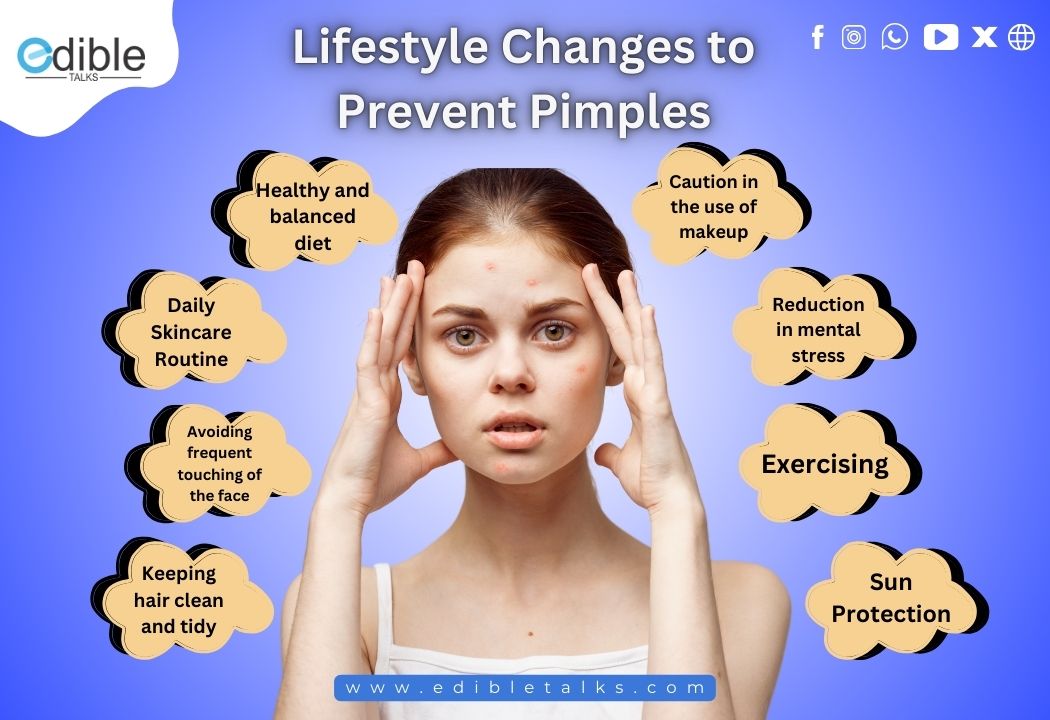
-
Eating a healthy and balanced diet:
Diet is directly related to skin health. Some foods can make pimples worse, while some foods help keep the skin healthy.
- Fruits and vegetables: Rich in vitamins and antioxidants, fruits and vegetables give the skin a natural glow and help prevent pimples.
- Adequate consumption of water: Drinking 8 to 10 glasses of water daily keeps the skin hydrated and helps to flush out toxins from the body.
- Cut down on fats and sweets: High consumption of oil, sugar, and fast foods can lead to pimples. Reducing their use has a positive effect on the skin.
- Caution with dairy products: According to some research, high consumption of dairy products (especially milk) can cause pimples due to hormonal changes.
-
Daily Skincare Routine:
Keeping the skin clean is an effective way to prevent pimples.
- Wash face twice a day: Use a mild cleanser to remove excess oil, dirt and impurities from the skin.
- Don’t wash your face too much: Washing your face too much can dry out the skin, leading to oily skin and pimples.
- Use a moisturizer: Dry skin can aggravate pimples, so use a mild and oil-free moisturizer that suits your skin type.
-
Avoiding frequent touching of the face:
Frequent touching of the face transfers dirt, grime, and bacteria from the hands to the skin, which can clog pores and lead to pimples. So, avoid touching your face unnecessarily.
-
Keeping hair clean and tidy:
Hair oil and dirt can clog skin pores, especially if the hair is on the face.
- Hair Cleaning: It is important to keep the hair clean so that the grease and dirt in it does not affect the skin.
- Avoid oil: If you use oil, try to keep it away from your face.
-
Caution in the use of makeup:
Makeup can clog skin pores, especially if the makeup is high in oil.
- Non-comedogenic makeup: Use makeup that doesn’t clog pores.
- Remove makeup properly: Always remove makeup thoroughly before going to bed so that pores do not clog.
-
Reduction in mental stress (Stress Management):
Stress can lead to skin problems, especially pimples. Try different methods to reduce stress levels such as:
- Meditation and Yoga: Both of these provide peace of mind and help reduce stress.
- Sleep: Adequate sleep is essential for skin health. 7-8 hours of sleep a night gives the skin a chance to rest and renew itself.
-
Exercising:
Exercising improves blood circulation, which provides more oxygen to the skin and flushes toxins out of the body.
- Cleansing the skin after sweating: After exercise, sweat can accumulate on the skin and clog the pores, so it is important to wash the face after exercise.
-
Sun Protection:
The sun’s rays can damage the skin and make pimples worse.
- Use of sunscreen: Use a sunscreen of SPF 30 or higher whenever you go out in the sun.
- Avoid prolonged sun exposure: Avoid prolonged exposure to direct sunlight, especially between 10 am and 2 pm.
-
Keeping hands and towels clean:
To prevent pimples, it is important to take special care of cleanliness.
- Keep towels and pillowcases clean: Wash towels and pillowcases regularly to prevent bacteria build-up on the skin.
- Wash your hands: Always wash your hands before touching your face to avoid transferring bacteria to the skin.
-
Precautions in Medicines and Supplements:
Certain medications or supplements can cause pimples. If you are taking any medications or supplements and they are causing pimples, consult your doctor.
-
Avoid harsh facial cleansing products:
Sometimes products containing harsh chemicals can damage the skin and aggravate pimples. So choose a cleanser or toner that is gentle on the skin and oil-free.
-
Quit smoking and alcohol consumption:
Smoking and alcohol can damage the skin and make pimples worse. Avoiding these habits improves skin health.
When to See a Dermatologist
Acne is usually treatable at home or with over-the-counter (OTC) products for most people, but in certain situations it may be necessary to see a dermatologist. . Complex skin conditions, long-term problems, or severe pimples require the help of a dermatologist to be properly diagnosed and treated. Here’s a breakdown of when you should visit a dermatologist:
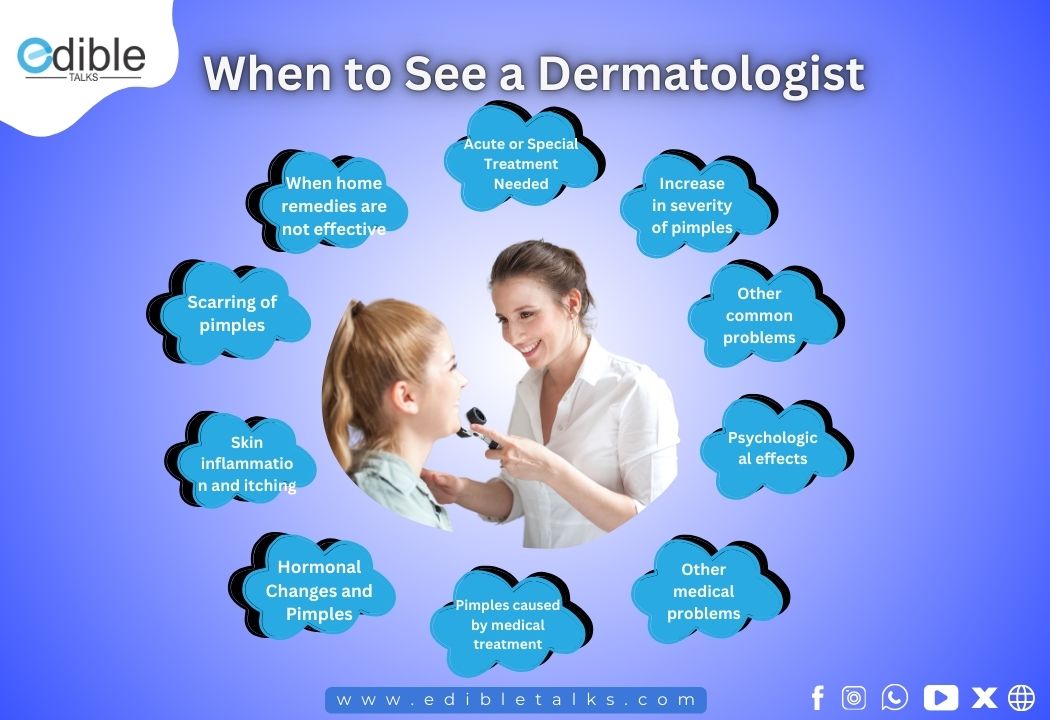
-
When home remedies are not effective:
If you’ve tried several home or OTC remedies for pimples and haven’t seen any improvement after a few weeks, it may be a sign that you need professional help. A dermatologist can better understand your skin condition and prescribe specific treatments or medications.
-
Increase in severity of pimples:
Pimples vary in severity, and sometimes they can be severe and persistent, known as severe acne. This may include the following symptoms:
- Large and painful cysts or nodules (internal pimples).
- Pimples that feel hard or deep under the skin.
- Frequent breakouts and infections of new pimples.
If you experience such severe symptoms, it is important that you consult a specialist as soon as possible as home remedies or OTC medicines will not be effective.
-
Scarring of pimples:
Sometimes pimples leave scars on the skin after they heal. If you notice dark marks, pits, or spots forming on the skin after your pimples, it’s important to see a dermatologist. Dermatologists may recommend special treatments to prevent skin damage and reduce existing scars, such as:
- Laser therapy
- Chemical Pills
- Microneedling
-
Skin inflammation and itching due to pimples:
In some cases, pimples can be accompanied by severe itching, inflammation, and burning. If you feel that the skin around the pimples is very sensitive or inflamed and is causing you pain, it is important to see a dermatologist to prevent further skin damage.
-
Hormonal Changes and Pimples:
Hormonal acne is very common in women, especially:
- During menstruation.
- During pregnancy or menopause.
- Due to medical conditions such as polycystic ovary syndrome (PCOS).
If hormonal changes are causing pimples, a dermatologist may recommend hormone therapy or other treatments to reduce the effects of hormones.
-
Other common problems with pimples:
Sometimes pimples can appear along with other skin problems such as eczema, rosacea, or psoriasis. If you notice other acne problems besides pimples, it is important to consult a specialist doctor for proper diagnosis and treatment.
-
Psychological effects due to pimples:
In severe cases of pimples, people often suffer from psychological problems, such as:
- Loss of confidence
- Depression
- Frustration and stress
If pimples are causing you to be dissatisfied with your appearance or having trouble socializing, a dermatologist can help restore your confidence by treating your skin.
-
Other medical problems behind pimples:
In some cases, pimples may be caused by another medical problem, such as:
- A bacterial infection that continues to grow.
- Allergic rash that appears with pimples.
A dermatologist can perform a thorough skin examination to determine if there is another underlying health problem behind the pimples, and treat accordingly.
-
Pimples caused by medical treatment or medication:
Some medications can cause pimples, such as:
- Steroids.
- Antidepressants (Antidepressants).
- Hormonal medications.
If you think your current medication is causing your pimples, you should consult a dermatologist to find a better alternative treatment.
-
Having pimples on other parts of the body:
If the pimples are on other parts of the body besides the face, such as:
- Back (Back Acne),
- neck,
- chest,
or appearing on the arms, and the problem is serious, it is important to consult a dermatologist.
-
Acute or Special Treatment Needed for Pimples:
Certain treatments such as:
- Accutane is a powerful antibiotic drug.
- Phototherapy or laser treatment.
These treatments are usually done only on the advice of a dermatologist. If your pimples are not getting under control with home remedies, a dermatologist may recommend these special treatments for you.
Conclusion
In conclusion, home remedies for pimples offer an effective and natural way to manage and reduce breakouts. From soothing ingredients like aloe vera and honey to antibacterial solutions like tea tree oil and garlic, these remedies harness the power of nature to heal your skin without harsh chemicals. While these treatments can help with mild to moderate pimples, it’s important to maintain a consistent skincare routine and adopt healthy lifestyle habits for long-term results. For persistent or severe acne, consulting a dermatologist is always a wise step to ensure proper care and treatment.
